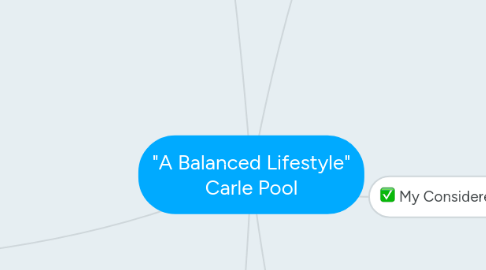
1. ENJOYING A BALANCED LIFESTYLE
2. What is a 'balanced lifestyle?
2.1. Sleep Pattern
2.1.1. A balanced sleep pattern is a vital part of a young adults growth and development. Sleep is important for everyone - young, old, dog, cat - you name it. But what is a balanced sleep pattern and why do we need it? You should always aim to have a regular sleeping pattern each day with at least 8 hours of rest a night. Sleep is a time for your body to rejuvenate and recover from a long day, anything less than 8 hours just isn't enough. Yes, we do have work to be done, events to be attended, social requirements, sporting requirements and maybe some even suffer from other things that keep them up at night, but sleep is a necessity for people of all ages. Without having this time to recover, ask yourself what would happen? Well we would all be very grumpy and have the inability to concentrate and participate properly in our daily activities.
2.2. Diet
2.2.1. The word diet can refer to one of many things. 1. It can mean refer to a particular selection of food, especially designed or prescribed to improve a person's physical condition or to prevent or treat a disease. 2. People can go on diets to lose weight or even put on weight, gain muscle and to prepare for a sporting event. 3. People can also have diets that are vegetarian, vegan, pescatarian etc. 4. A diet can also mean what you eat in general - what your parents provide you with. Diets are different for everyone and can change all the time depending what you do and who you are. A balanced diet for a normal person would consist of the suitable amount of each nutrient and food group. Daily intake of the 5 different food groups: Dairy products (2-3 serves), Oils and fats (2 serves), Meats and substance (3-6 serves), Fruit and Veg (3-4 serves), Breads and cereals (5-6 serves). Nutrient groups: Protein, Carbohydrates, Fat, Vitamins, Minerals, Water, Fibre.
2.3. Exercise
2.3.1. Exercise is a highly promoted key factor in a balanced lifestyle. Speaking from personal experience, exercise always makes me a much friendlier person, provides time to clear my head, stop worrying about work and keeps me fit and healthy. Based on research, 2-3 quality workout sessions is beneficial to a balanced lifestyle. Of course athletes may do many training sessions everyday for a particular sport - which is good (but also hard to maintain a balanced lifestyle, although manageable). Exercise is essential to keeping healthy, even preventing diseases in some cases and in general is just an amazing thing to do.
2.4. Relaxation
2.4.1. It is always good to have me time, a time just spent by yourself, kicking your feet up and doing the thing that you most enjoy. A balanced lifestyle should have the time of relaxation included in it. Time to reflect, blow of some steam and just chill out.
2.5. Social Life
2.5.1. Being busy with sport, work and general time consuming things, doesn't make it easy to have a social life. Yes, we socialise in the work environment, sporting environment etc. but we need to learn and live outside of these boundaries sometimes - that isn't as competitive and what not. Going out and making new friends, or even spending time with friends, is also a part of having a balanced life style.
3. Bibliography
3.1. Unknown. (1995). Work/life balance and stress management. Retrieved from Queensland Government: https://www.qld.gov.au/health/mental-health/balance/lifestyle/ Unknown. (2016). Looking After Yourself. Retrieved from Kids Helpline: https://kidshelpline.com.au/teens/tips/looking-after-yourself/
4. My Considered Strengths
4.1. Well-Being
4.1.1. My well-being is a positive part of my lifestyle. I have a family that puts a roof over my head, feed me, encourage me to do well in academics and sport and they love me. The well-being of my life is effected by the activities that I undertake, how I sleep at night and my nutrition. A bonus is I don't get sick to often as well. Because I have a considerable strength in those terms I can live well.
4.2. Activity
4.2.1. A strength in my daily activity would definitely be my swimming and water polo. I swim once a day everyday except for Sundays and I have water polo training twice a week and a match on Saturdays. These two activities add to my balance in life as a strength. They give me a positive mind set during the week. Keep me fit and healthy. The two sports are also very social and a great way to blow off steam and take it out on the water.
4.3. Sleep
4.3.1. I often get a good nights sleep, especially on a Saturday night.
4.4. Nutrition
4.4.1. My nutrition is full of protein and carbs, I drink plenty of water!
5. My Considered Weaknesses
5.1. Well-Being
5.1.1. Some weak areas in my well-being are my long hours spent on the lap-top watching TV shows - but this can be improved by changing lap-top into book occasionally. Otherwise I live pretty well.
5.2. Activity
5.2.1. A downfall in my activity would be extra-circular in school. I don't participate in as much as I would like to at school, such as, music and some more team sports.
5.3. Sleep
5.3.1. During the week I have a very irregular sleeping pattern. This is because of work load as well as sporting commitments (water polo finishes at 8.30 pm on a Tuesday and Thursday night.
5.4. Nutrition
5.4.1. My diet could include more fruit and vegetables and a cut back on the high sugar foods.
